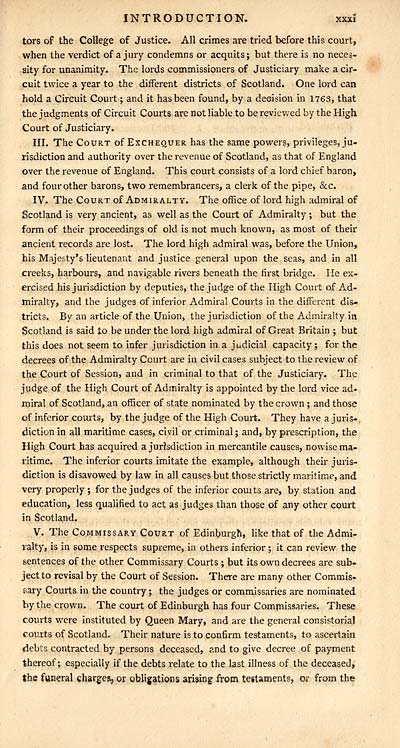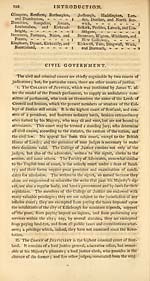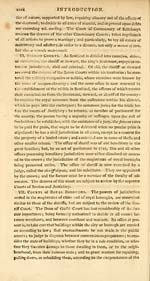Gazetteer of Scotland
(43) Page xxxi
Download files
Complete book:
Individual page:
Thumbnail gallery: Grid view | List view

INTRODUCTION. xxxi
tors of the College of Justice. All crimes are tried before this court,
when the verdict of a jury condemns or acquits; but there is no neces-
sity for unanimity. The lords commissioners of Justiciary make a cir-
cuit twice a year to the different districts of Scotland. One lord can
hold a Circuit Court ; and it has been found, by a decision in 1763, that
the judgments of Circuit Courts are not liable to be reviewed by the High
Court of Justiciary.
III. The Court of Exchequer has the same powers, privileges, ju-
risdiction and authority over the revenue of Scotland, as that of England
over the revenue of England. This court consists of a lord chief baron,
and four other barons, two remembrancers, a clerk of the pipe, &c.
IV. The Court of Admiralty. The office of lord high admiral of
Scotland is very ancient, as well as the Court of Admiralty ; but the
form of their proceedings of old is not much known, as most of their
ancient records are lost. The lord high admiral was, before the Union,
his Majesty's lieutenant and justice general upon the seas, and in all
creeks, harbours, and navigable rivers beneath the first bridge. He ex-
ercised his jurisdiction by deputies, the judge of the High Court of Ad-
miralty, and the judges of inferior Admiral Courts in the different dis-
tricts. By an article of the Union, the jurisdiction of the Admiralty in
Scotland is said to be under the lord high admiral of Great Britain ; but
this does not seem to infer jurisdiction in a judicial capacity ; for the
decrees of the Admiralty Court are in civil cases subject to the review of
the Court of Session, and in criminal to that of the Justiciary. The
judge of the High Court of Admiralty is appointed by the lord vice ad-
miral of Scotland, an officer of state nominated by the crown ; and those
of inferior courts, by the judge of the High Court. They have a juris-,
diction in all maritime cases, civil or criminal ; and, by prescription, the
High Court has acquired a jurisdiction in mercantile causes, nowise ma-
ritime. The inferior courts imitate the example, although their juris-
diction is disavowed by law in all causes but those strictly maritime, and
very properly ; for the judges of the inferior courts are, by station and
education, less qualified to act as judges than those of any other court
in Scotland.
V. The Commissary Court of Edinburgh, like that of the Admi-
ralty, is in some respects supreme, in others inferior ; it can review the
sentences of the other Commissary Courts ; but its own decrees are sub-
ject to revisal by the Court of Session. There are many other Commis-
sary Courts in the country ; the judges or commissaries are nominated
by the crown. The court of Edinburgh has four Commissaries. These
courts were instituted by Queen Mary, and are the general consistorial
courts of Scotland, Their nature is to confirm testaments, to ascertain
debts contracted by persons deceased, and to give decree of payment
thereof; especially if the debts relate to the last illness of the deceased,
the funeral charges, or obligations arising from testaments, or from the
tors of the College of Justice. All crimes are tried before this court,
when the verdict of a jury condemns or acquits; but there is no neces-
sity for unanimity. The lords commissioners of Justiciary make a cir-
cuit twice a year to the different districts of Scotland. One lord can
hold a Circuit Court ; and it has been found, by a decision in 1763, that
the judgments of Circuit Courts are not liable to be reviewed by the High
Court of Justiciary.
III. The Court of Exchequer has the same powers, privileges, ju-
risdiction and authority over the revenue of Scotland, as that of England
over the revenue of England. This court consists of a lord chief baron,
and four other barons, two remembrancers, a clerk of the pipe, &c.
IV. The Court of Admiralty. The office of lord high admiral of
Scotland is very ancient, as well as the Court of Admiralty ; but the
form of their proceedings of old is not much known, as most of their
ancient records are lost. The lord high admiral was, before the Union,
his Majesty's lieutenant and justice general upon the seas, and in all
creeks, harbours, and navigable rivers beneath the first bridge. He ex-
ercised his jurisdiction by deputies, the judge of the High Court of Ad-
miralty, and the judges of inferior Admiral Courts in the different dis-
tricts. By an article of the Union, the jurisdiction of the Admiralty in
Scotland is said to be under the lord high admiral of Great Britain ; but
this does not seem to infer jurisdiction in a judicial capacity ; for the
decrees of the Admiralty Court are in civil cases subject to the review of
the Court of Session, and in criminal to that of the Justiciary. The
judge of the High Court of Admiralty is appointed by the lord vice ad-
miral of Scotland, an officer of state nominated by the crown ; and those
of inferior courts, by the judge of the High Court. They have a juris-,
diction in all maritime cases, civil or criminal ; and, by prescription, the
High Court has acquired a jurisdiction in mercantile causes, nowise ma-
ritime. The inferior courts imitate the example, although their juris-
diction is disavowed by law in all causes but those strictly maritime, and
very properly ; for the judges of the inferior courts are, by station and
education, less qualified to act as judges than those of any other court
in Scotland.
V. The Commissary Court of Edinburgh, like that of the Admi-
ralty, is in some respects supreme, in others inferior ; it can review the
sentences of the other Commissary Courts ; but its own decrees are sub-
ject to revisal by the Court of Session. There are many other Commis-
sary Courts in the country ; the judges or commissaries are nominated
by the crown. The court of Edinburgh has four Commissaries. These
courts were instituted by Queen Mary, and are the general consistorial
courts of Scotland, Their nature is to confirm testaments, to ascertain
debts contracted by persons deceased, and to give decree of payment
thereof; especially if the debts relate to the last illness of the deceased,
the funeral charges, or obligations arising from testaments, or from the
Set display mode to: Large image | Transcription
Images and transcriptions on this page, including medium image downloads, may be used under the Creative Commons Attribution 4.0 International Licence unless otherwise stated. ![]()
| Gazetteers of Scotland, 1803-1901 > Gazetteer of Scotland > (43) Page xxxi |
|---|
| Permanent URL | https://digital.nls.uk/97415078 |
|---|

